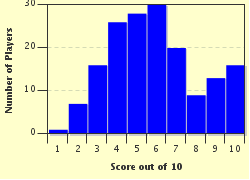Quiz Answer Key and Fun Facts
1. Who came up with the 'Multi-Store Model of Memory'?
2. Miller (1956) researched the capacity of our short-term memory. What did he say was the capacity of short-term memory?
3. What was the role of the Central Executive in the Working Memory Model?
4. Which component did Baddeley add into the Working Memory Model that acts as a general store?
5. Loftus and Palmer did a study about misleading information and its effect on eyewitness testimony. What did they find about the descriptive word used in questioning eyewitnesses about an event?
6. What term did Loftus (1979) use to describe the belief that anxiety about a weapon affected the accuracy of eyewitness testimony?
7. In a cognitive interview, what does 'recall from a different perspective' involve?
8. What is an acrostic?
9. What type of encoding does long-term memory have?
10. Craik and Lockhart (1972) suggested memory is not made via rehearsal. What did they say that memory was made by?
Source: Author
Purling
This quiz was reviewed by FunTrivia editor
CellarDoor before going online.
Any errors found in FunTrivia content are routinely corrected through our feedback system.


